SPMA041G January 2012 – October 2015 TM4C1230C3PM , TM4C1230C3PM , TM4C1230D5PM , TM4C1230D5PM , TM4C1230E6PM , TM4C1230E6PM , TM4C1230H6PM , TM4C1230H6PM , TM4C1231C3PM , TM4C1231C3PM , TM4C1231D5PM , TM4C1231D5PM , TM4C1231D5PZ , TM4C1231D5PZ , TM4C1231E6PM , TM4C1231E6PM , TM4C1231E6PZ , TM4C1231E6PZ , TM4C1231H6PGE , TM4C1231H6PGE , TM4C1231H6PM , TM4C1231H6PM , TM4C1231H6PZ , TM4C1231H6PZ , TM4C1232C3PM , TM4C1232C3PM , TM4C1232D5PM , TM4C1232D5PM , TM4C1232E6PM , TM4C1232E6PM , TM4C1232H6PM , TM4C1232H6PM , TM4C1233C3PM , TM4C1233C3PM , TM4C1233D5PM , TM4C1233D5PM , TM4C1233D5PZ , TM4C1233D5PZ , TM4C1233E6PM , TM4C1233E6PM , TM4C1233E6PZ , TM4C1233E6PZ , TM4C1233H6PGE , TM4C1233H6PGE , TM4C1233H6PM , TM4C1233H6PM , TM4C1233H6PZ , TM4C1233H6PZ , TM4C1236D5PM , TM4C1236D5PM , TM4C1236E6PM , TM4C1236E6PM , TM4C1236H6PM , TM4C1236H6PM , TM4C1237D5PM , TM4C1237D5PM , TM4C1237D5PZ , TM4C1237D5PZ , TM4C1237E6PM , TM4C1237E6PM , TM4C1237E6PZ , TM4C1237E6PZ , TM4C1237H6PGE , TM4C1237H6PGE , TM4C1237H6PM , TM4C1237H6PM , TM4C1237H6PZ , TM4C1237H6PZ , TM4C123AE6PM , TM4C123AE6PM , TM4C123AH6PM , TM4C123AH6PM , TM4C123BE6PM , TM4C123BE6PM , TM4C123BE6PZ , TM4C123BE6PZ , TM4C123BH6PGE , TM4C123BH6PGE , TM4C123BH6PM , TM4C123BH6PM , TM4C123BH6PZ , TM4C123BH6PZ , TM4C123BH6ZRB , TM4C123BH6ZRB , TM4C123FE6PM , TM4C123FE6PM , TM4C123FH6PM , TM4C123FH6PM , TM4C123GE6PM , TM4C123GE6PM , TM4C123GE6PZ , TM4C123GE6PZ , TM4C123GH6PGE , TM4C123GH6PGE , TM4C123GH6PM , TM4C123GH6PM , TM4C123GH6PZ , TM4C123GH6PZ , TM4C123GH6ZRB , TM4C123GH6ZRB , TM4C123GH6ZXR , TM4C123GH6ZXR , TM4C1290NCPDT , TM4C1290NCPDT , TM4C1290NCZAD , TM4C1290NCZAD , TM4C1292NCPDT , TM4C1292NCPDT , TM4C1292NCZAD , TM4C1292NCZAD , TM4C1294KCPDT , TM4C1294KCPDT , TM4C1294NCPDT , TM4C1294NCPDT , TM4C1294NCZAD , TM4C1294NCZAD , TM4C1297NCZAD , TM4C1297NCZAD , TM4C1299KCZAD , TM4C1299KCZAD , TM4C1299NCZAD , TM4C1299NCZAD , TM4C129CNCPDT , TM4C129CNCPDT , TM4C129CNCZAD , TM4C129CNCZAD , TM4C129DNCPDT , TM4C129DNCPDT , TM4C129DNCZAD , TM4C129DNCZAD , TM4C129EKCPDT , TM4C129EKCPDT , TM4C129ENCPDT , TM4C129ENCPDT , TM4C129ENCZAD , TM4C129ENCZAD , TM4C129LNCZAD , TM4C129LNCZAD , TM4C129XKCZAD , TM4C129XKCZAD , TM4C129XNCZAD , TM4C129XNCZAD
3.4 Editing the dsplib Project Settings
After linking in all the source files, change the following default Code Composer Studio project settings:
- Right-click the dsplib-cm4f project in the Project Explorer and select Properties.
- Expand the Build entry, and then expand the ARM Compiler entry.
- Confirm that the Target_processor version (--silicon_version, -mv) entry matches your processor in the Processor Options panel (see Figure 5). For this example, the Target processor should be 7M4 (as opposed to 7M3 for any of the Stellaris Cortex-M3 products).
- Click the Optimization level (--opt_level, -O) drop-down menu in the Optimization panel and select 2 (see Figure 6).
- Expand the Advanced Options section of the ARM Compiler pane, and select Assembler Options.
- Click the Use unified assembly language (--ual) checkbox to select that option (see Figure 7).
- Click the Emit diagnostic identifier numbers (--display_error_number, -pden) checkbox in the Diagnostic Options panel to deselect.
- Add the DSP library CMSIS-<version>/CMSIS/Include directory to the compiler’s include path in the Include Options panel. This is done by pressing the Add button by the Add dir to #include search path (--include_path, -I) (see Figure 9), then either typing in the path to the CMSIS Include directory or clicking Browse and navigating to the Include directory and navigating to the Include directory (CMSIS-<version>/CMSIS/Include).
- Expand the Advanced Options menu again and select the Predefined Symbols panel. Create a symbol to tell the DSP library to use Cortex-M4 based math functions. Click the Add... button in the Pre-define NAME (--define, -D) area. In the Enter Value dialog box, type ARM_MATH_CM4 into the Pre-define NAME (--define, -D) field and click OK (see Figure 10). Click the Add… button again type __FPU_PRESENT=1 into the Pre-define NAME (--define, -D) field and click OK.
- Select the on option from the Place each function in a separate subsection (--gen_func_subsections, -ms) drop-down menu in the Runtime Model Options panel (see Figure 11).
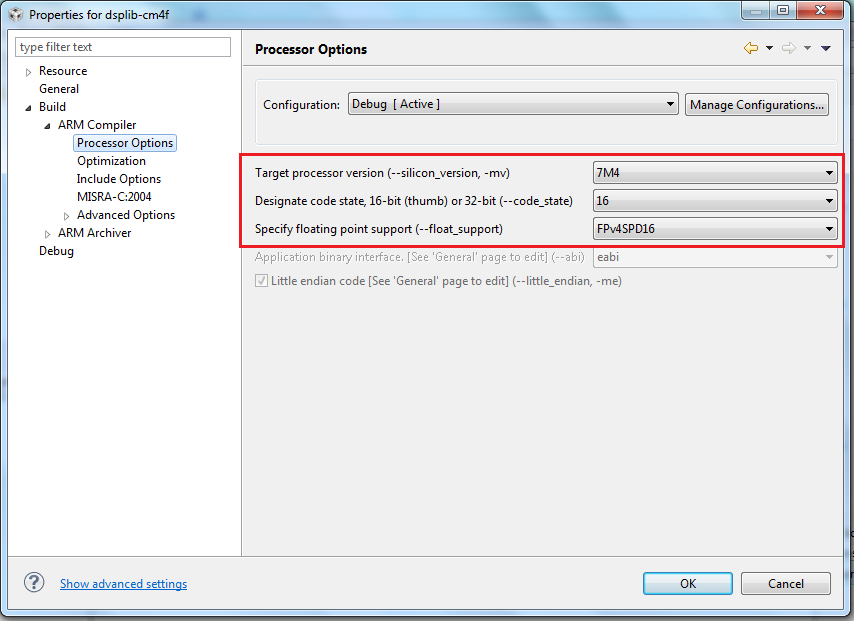 Figure 5. The Processor Settings for a Cortex-M4 Processor With Hardware FPU Support
Figure 5. The Processor Settings for a Cortex-M4 Processor With Hardware FPU Support 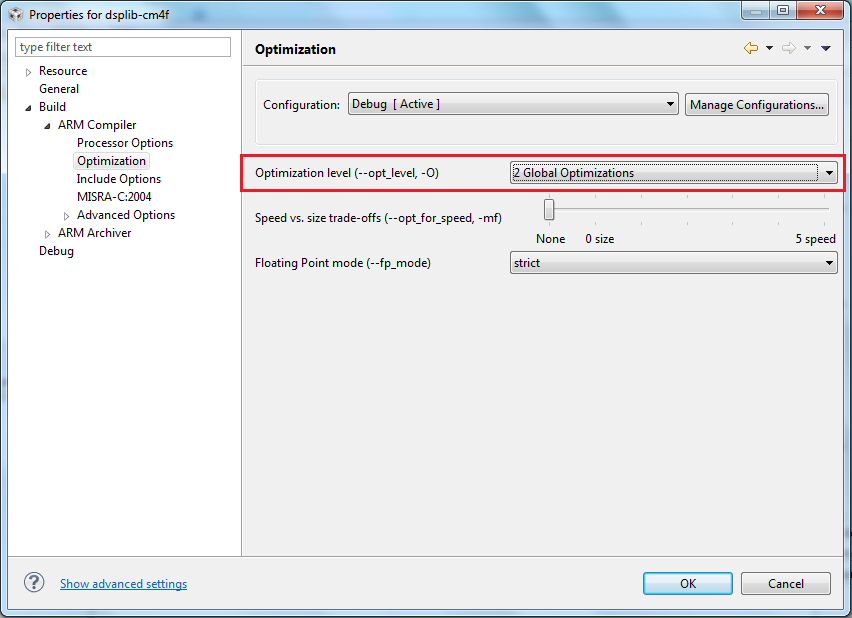 Figure 6. The Proper Optimization Settings for Compiling the DSP_Lib Source Code
Figure 6. The Proper Optimization Settings for Compiling the DSP_Lib Source Code 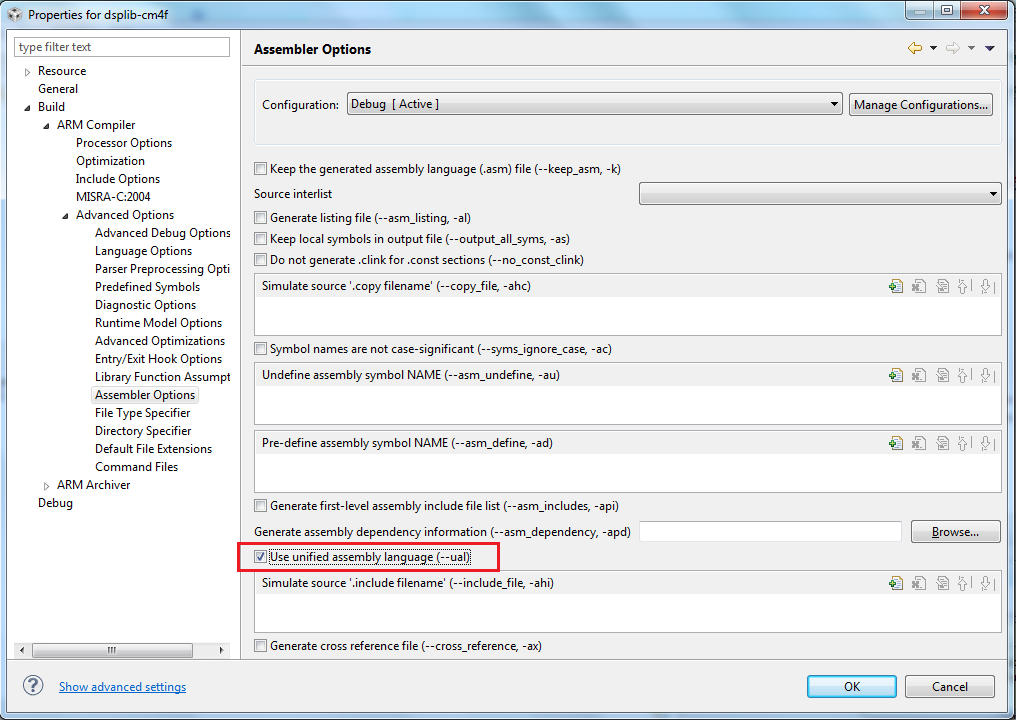 Figure 7. Setting the Assembler to Use Unified Assembly Language
Figure 7. Setting the Assembler to Use Unified Assembly Language 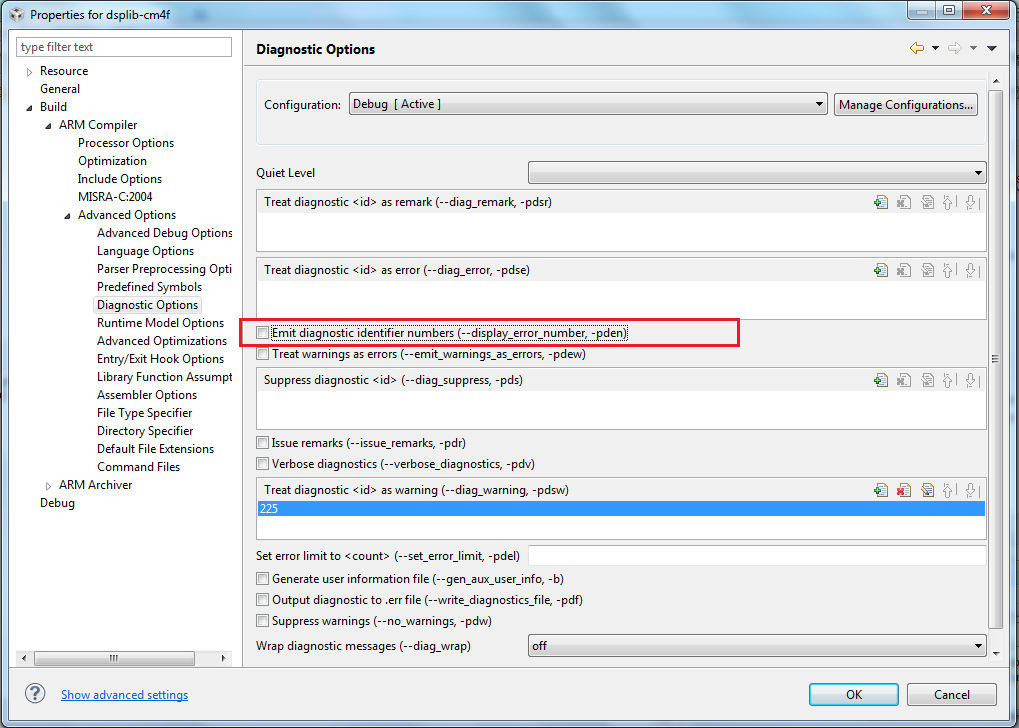 Figure 8. Verifying That Diagnostic Identifier Numbers will not be Emitted
Figure 8. Verifying That Diagnostic Identifier Numbers will not be Emitted 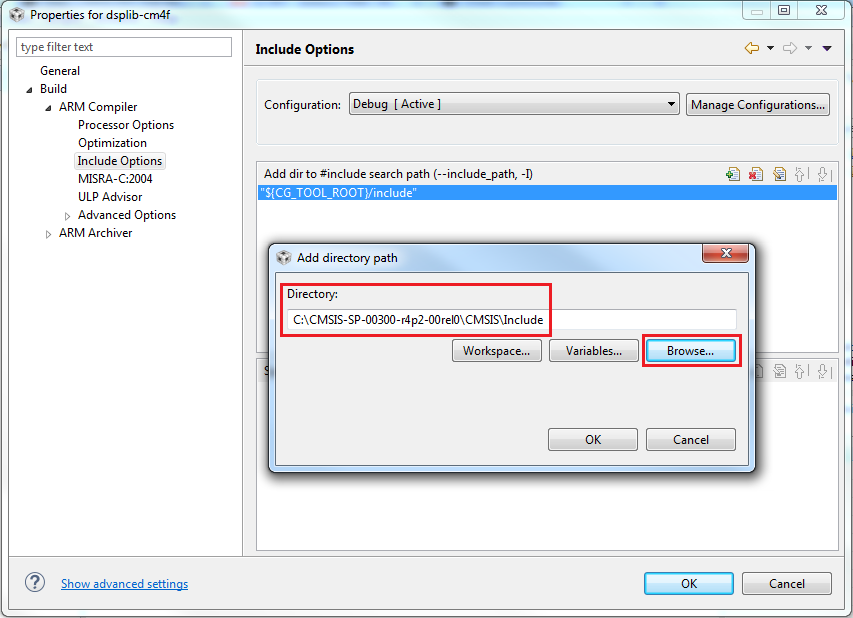 Figure 9. Adding the CMSIS Top Level Include Directory to the Compiler's #include Search Path
Figure 9. Adding the CMSIS Top Level Include Directory to the Compiler's #include Search Path 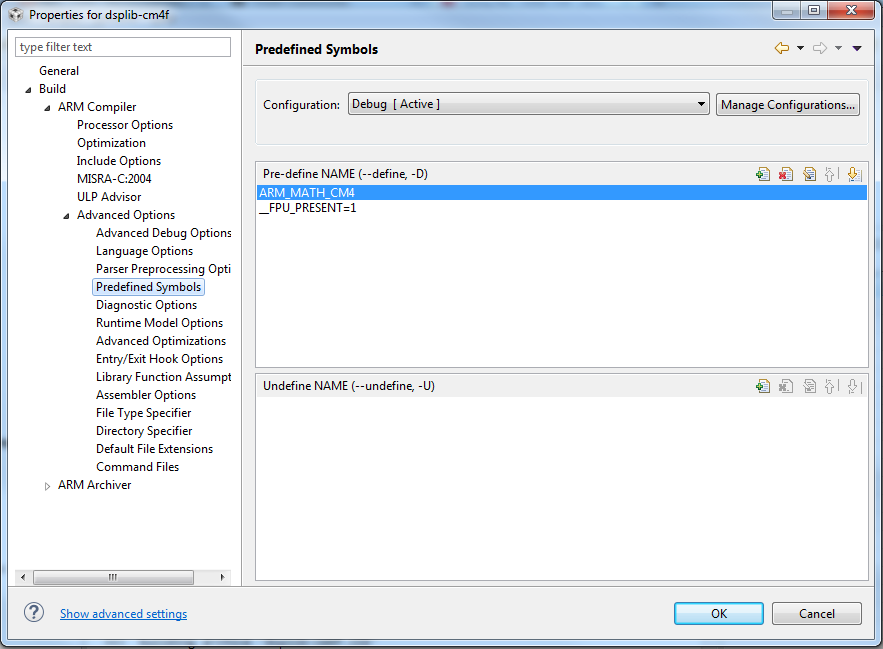 Figure 10. Adding Project Level #defines for the Processor Characteristics
Figure 10. Adding Project Level #defines for the Processor Characteristics 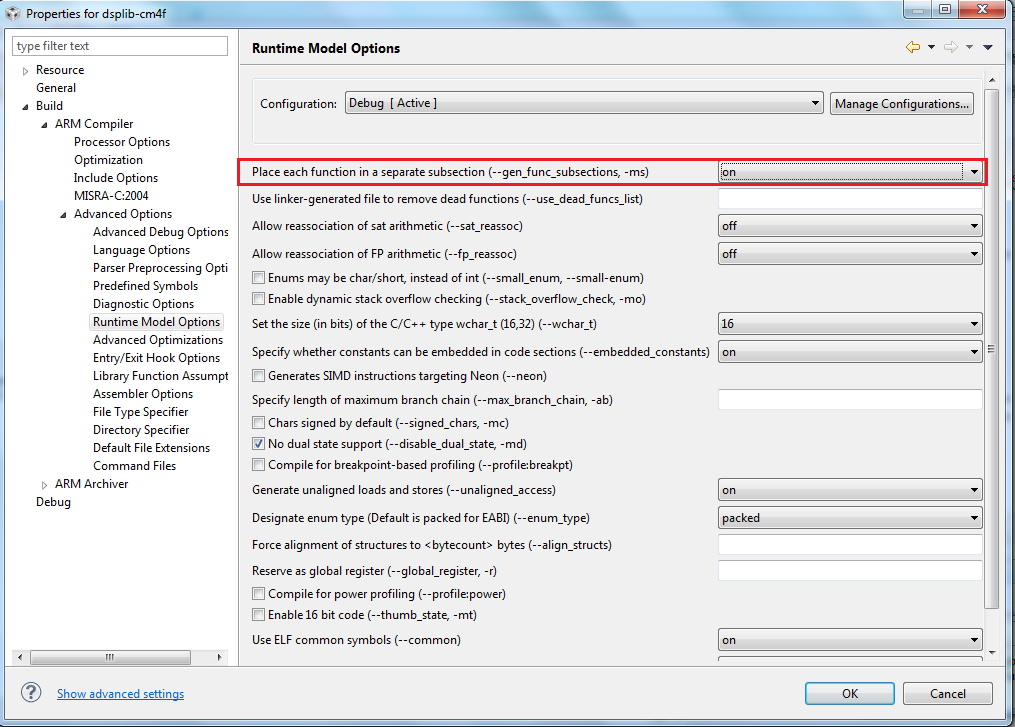 Figure 11. The Proper Runtime Model Options for Compiling the DSP_Lib Source Code
Figure 11. The Proper Runtime Model Options for Compiling the DSP_Lib Source Code